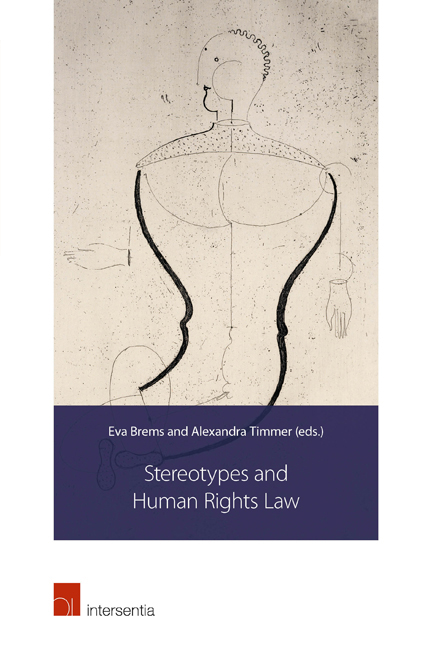Book contents
- Frontmatter
- Contents
- Introduction
- Building Momentum Towards Change. How the UN's Response to Stereotyping is Evolving
- Gender Stereotyping in Domestic Violence Cases. An Analysis of the European Court of Human Rights’ Jurisprudence
- Gender Stereotyping in the Case Law of the Inter‑American Court of Human Rights
- ‘My Sense of Humanity Has Gone Down the Drain’. Stereotypes, Stigma and Sanism
- Racial Stereotypes and Human Rights
- The Head of the Woman is the Man. The Failure to Address Gender Stereotypes in the Legal Procedures around the Dutch SGP
- Gender Stereotyping in the Military. Insights From Court Cases
Racial Stereotypes and Human Rights
Published online by Cambridge University Press: 22 December 2017
- Frontmatter
- Contents
- Introduction
- Building Momentum Towards Change. How the UN's Response to Stereotyping is Evolving
- Gender Stereotyping in Domestic Violence Cases. An Analysis of the European Court of Human Rights’ Jurisprudence
- Gender Stereotyping in the Case Law of the Inter‑American Court of Human Rights
- ‘My Sense of Humanity Has Gone Down the Drain’. Stereotypes, Stigma and Sanism
- Racial Stereotypes and Human Rights
- The Head of the Woman is the Man. The Failure to Address Gender Stereotypes in the Legal Procedures around the Dutch SGP
- Gender Stereotyping in the Military. Insights From Court Cases
Summary
This contribution maps the difficulties of recognising racial stereotypes as a human rights issue. Starting from the most serious human rights violations occurring in in conjunction with some form of physical violence, moving on to human rights violations in the absence of such violence, and finishing with the analysis of the practice of two specialised international human rights institutions fight against racism (CERD and ECRI), the argument is that so far insufficient explicit attention is paid to racial stereotyping in binding international law. A comparison with the different recognition of gender stereotypes under human rights law strengthens this argument and shows, at the same time, how fighting against racial stereotypes could and should become a broader human rights law issue.
This contribution argues that racial stereotypes and/or stereotyping are insufficiently taken into account under binding human rights law and international criminal law. The role played by such stereotypes in contributing to ongoing structural racial discrimination is either ignored or only implicitly/ indirectly addressed, and only very rarely explicitly recognised as a human rights violation. Instead, in non-binding recommendations their role is better highlighted but the limited impact of such recommendations – as welcome as they may be – warrants that more needs to be done.
Before entering into the substance of this article, it is important to explain some key terms and distinctions, mainly that between (racial) prejudices and (racial) stereotypes. So far, lawyers have not been heavily involved in untangling the differences between these terms and it is certainly not my aim to do so here. But the distinctions that have been elaborated mainly in the literature of social psychology, show why speaking in terms of stereotypes is conceptually and also qualitatively somewhat different. While there is no unitary definition of stereotypes and/or prejudice, some social psychologists have defined the former as ‘beliefs about another group in such terms as personality traits, attributions, or behavioural descriptions’ and the latter as ‘negative attitudes toward another group that express negative affective or emotional reactions’. Others have added that prejudices serve to ‘create and maintain hierarchical status relations between groups’ and that stereotypes ‘shape how people think about and respond to the group’.
- Type
- Chapter
- Information
- Stereotypes and Human Rights Law , pp. 119 - 142Publisher: IntersentiaPrint publication year: 2016
- 1
- Cited by



